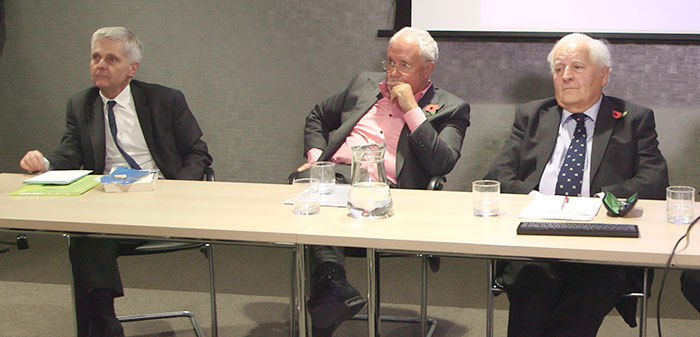
Panel at CIPFA's Layfield: 40 years on event: Tony Travers, Sir Michael Lyons, and George Jones. Photo: CIPFA
George Jones was speaking at an event to mark 40 years since the publication of Sir Frank Layfield’s review, which called for a new constitutional settlement between central and local government. He echoed one of Layfield’s recommendations, saying devolution would need some kind of local personal taxation if it was to be successful. The Layfield report had called for a local income tax in its report in May 1976.
Asked if the current round of devolution was limited or doomed, he said: “I’d say it is doomed because, in all the schemes, there’s no devolution of fiscal powers other than business rates, which are irrelevant because they don’t bear on voters.”
Jones said the Layfield report focused on political responsibility and accountability rather than the technicalities of rates and grants, which gave it considerable constitutional importance.
“It proposed a choice based on two sets of arrangements – one based mainly on central responsibility and the other based mainly on local responsibility.”
Layfield argued no system of local government finance would be satisfactory if it did not follow from a “desired pattern of relations”, Jones added.
However, the Labour government led by Jim Callaghan did not opt for either of these arrangements, nor a middle way with minimum standards paid for by grant. Instead, the government pursued what Jones called a “muddle way” that was not clear where the main responsibility for local government finance should lie. This confusion allowed centralisation to increase in subsequent years, he said.
Both central and local government were embarrassed by Layfield, Jones argued, as it had raised fundamental questions they did not want to answer about the distribution of power in society.
Also speaking at the event, Sir Michael Lyons, who led a review of local government funding published in March 2007, agreed that Layfield pointed to a different way of running the country. Like Layfield, Lyons said, his report concluded that changes to local government finance could not effectively happen without its role being made clearer.
“Like him, I stressed there was no simple magic formula,” Lyons told attendees. “I said that key debates had to be about the key relationship between the centre and localities – not a simple call for devolution but a new contract that established very clearly those things that are national entitlements and those things that should be left to local determination.”
The government was also embarrassed by the scope of his proposed reforms and, in particular, was “petrified” they would be caught out on the issue of council tax revaluation.
While the coalition and the current governments had shown interest in devolution, it was a permissive kind, with rules councils had to meet. While business rates localisation was interesting, it was “manifestly not” the way to reach a new constitutional settlement, he said.
“If I’m working for an individual authority looking to further the interests of my community, I would take every opportunity that came along, believing that there is no appetite for the big questions set out in Layfield. I wouldn’t criticise folk for doing that, but it no more than a partial, limited improvement from where we are.”
Also speaking at the event, Tony Travers, the director of the Greater London group at the London School of Economics and chair of the London Finance Commission, said this amounted to “centralised decentralisation”.
He added: “If you have a system as centralised as this one, decentralisation is part of a centralised process, so it is very much step by step,” he said. “It is such a centralised system that even a tiny step towards decentralising a little bit of service freedom requires not only the Treasury to be convinced of it, but the service department. It is where we are starting from that makes this such a difficult process.”
Mike Owen, chief executive of Bury Council, said the Layfield report had highlighted a series of issues – including who held the purse strings and controlled public services – that were still of importance today.
Layfield had decided local autonomy was the right way to go. “This was absolutely right,” Owen concluded. “It really did start a debate that has gone on for 40 years, and that is a great credit to Layfield and a great credit to the report itself and to the [inquiry] committee.”




















